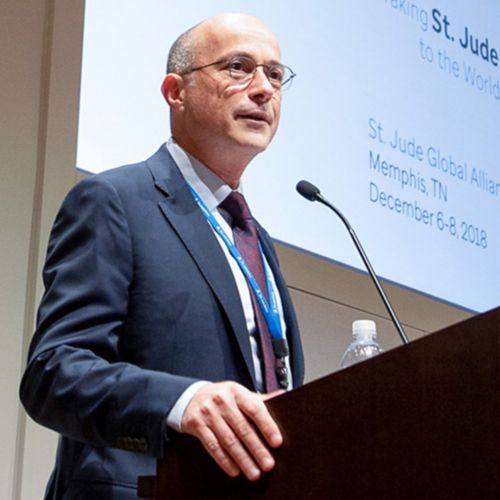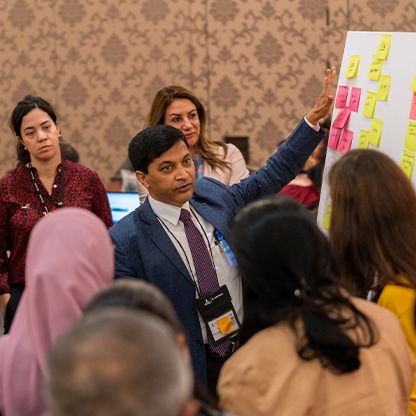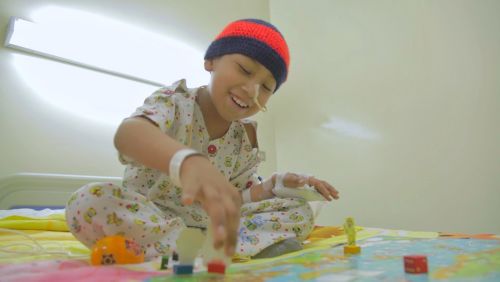St. Jude Family of Websites
Explore our cutting edge research, world-class patient care, career opportunities and more.
St. Jude Children's Research Hospital Home

- Fundraising
St. Jude Family of Websites
Explore our cutting edge research, world-class patient care, career opportunities and more.
St. Jude Children's Research Hospital Home

- Fundraising
Global Scholars: Dr. Rawad Rihani
Other Global Scholars Projects:
Rawad Rihani Sees Patients as 'Daily Gifts'
As Dr. Rawad Rihani was wrapping up her pediatric residency program at the Jordan University Hospital in Amman, Jordan, she learned the hospital’s lone pediatric oncologist was retiring due to health issues.
At the time, she estimates, there were only two or three pediatric oncologists in the entire country. This retirement left a small group of cancer patients in need of care in the pediatric ward. At the time, Rihani was a member of the general pediatric team. “But I took it on as my responsibility as I really wanted these children to make it,” she says. “It was like they were my personal patients.”
The moment was a tremendous challenge and a turning point.
“That’s when I decided I wanted to become a pediatric oncologist,” she says. “There was a great need in the country, and I found the discipline, although challenging, also very rewarding.”
Twenty years later, that is still the case. The rewards of watching a child get healthier, of hearing stories about former patients passing exams, going to university, getting married, she calls these moments daily gifts.
Rihani is now a pediatric oncologist and deputy chair of the Pediatric Department at the King Hussein Cancer Center (KHCC) in Jordan. She is also a member of the first cohort of Global Scholars earning the Master of Science in Global Child Health from the St. Jude Children’s Research Hospital Graduate School of Biomedical Sciences. It is a program, she says, that is building the future of pediatric oncology.
She says the Global Scholars Program is building a culture of leadership, partnership and collaboration. “I think eventually this program will reach to almost all countries,” she says.
Rihani herself embodies that spirit.

“Pediatric oncology patients are very special, and you have very deep connections with them." -- Dr. Rawad Rihani
She is a liaison for collaboration between St. Jude and the King Hussein Cancer Center. She represents Jordan as a board member of the Pediatric Oncology East and Mediterranean (POEM) group. She has helped support and build capacity for pediatric oncology units in neighboring countries. She is also chair of the Jordan Society of Pediatric Oncology.
Currently, she is assisting with other efforts, including a joint acute lymphoblastic leukemia protocol to standardize treatment and reporting across the region
“This master’s program has actually widened our scope, on looking into childhood cancer from different perspectives, regional and global,” she says. “Additionally, I’ve learned so much on leadership. I understand that leadership doesn’t have to be a position. It is what you practice with your patients, with yourself, with your colleagues, with your institution, with your country.”
Her Global Scholars Project will examine ways to strengthen local health systems by streamlining patient flow and reducing the need for pediatric inpatient oncology care. Rihani will focus on capacity, hospitalizations, waiting times, and lengths of stay. The goal is to optimize hospital resources for both inpatient and outpatient care.
“The project will prospectively look at what we’re doing in terms of admission, discharges and add interventions,” she says. “Those interventions can show how, with small changes and interventions, you can serve more patients with the same resources, and in more efficient ways.”
She hopes the project will serve as a model for other hospitals in other countries. Her goal is even more positive outcomes, more gifts for those helping children.
“Pediatric oncology patients are very special,” she says. “And you have very deep connections with them.
“I really see that it is not the same with other disciplines. There is more trust. There’s more connection. It’s a lifelong relationship with the patients and families,” Rihani says. “Even when patients finish their treatment, they continue following up for the late effects. You see the milestones in their life. You see where they are.
“Sometimes there are very difficult moments, but the fact that you really can make a difference, I think that’s the most important thing.”
Case in point: Some five years after helping that small group of children left vulnerable by a sudden retirement, she was walking down the hallway at King Hussein when a mother stopped her and gave her a big hug.
The daughter at her side had been one of those patients.
“That was the utmost gift,” Rihani says.


